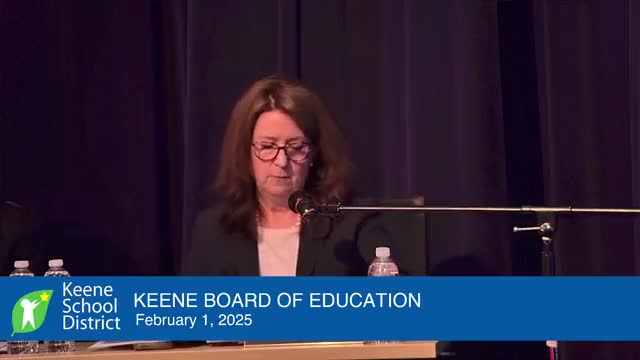Keene voters approve $79.1 million operating budget; amendment to add $250,000 for special education fails
Get AI-powered insights, summaries, and transcripts
Subscribe
Summary
Keene School District voters accepted the district operating budget of $79,100,705 at the first session March 11. An amendment to add $250,000 aimed at restoring special-education staffing failed by voice/hand count (14–31). Public comment focused on caseloads versus workload and whether added dollars could be earmarked for specific positions.
Keene voters on March 11 approved the Keene School District operating budget of $79,100,705, the district’s proposed 2025–26 spending plan, after rejecting an amendment to increase the figure by $250,000 aimed at restoring special-education staffing.
The amendment, moved by Jennifer Kiernan, a special educator and Keene resident, sought to increase the proposed operating budget to $79,350,705. Kiernan said the money would “give money to higher special educators that are being cut” and asked the meeting to target caseloads under 20. Eric Murphy, a Keene resident, seconded the motion. After public discussion and a show-of-hands count, the amendment failed with 14 votes in favor and 31 opposed.
Why it matters: the approved operating budget will appear on the March ballot as presented by the Board. The district explained that if Article 1 fails at the ballot, the default budget would be $77,683,980 and the board may call a special meeting under RSA 40 (as described at the session) to address a revised operating budget.
District presentation and debate Jacquelyn Headings, a member of the Keene School Board, opened discussion of Article 1 and summarized materials in the annual report. Headings said the proposed 2025–26 operating budget represents a roughly 3 percent net increase over the current operating baseline and described the default budget calculation used if the warrant article were defeated. The presenters highlighted revenue changes, including a reported non-property-tax revenue decrease of $206,216 and an estimated tax-impact example of $109.46 per $100,000 of assessed value.
Public commenters focused on special education staffing levels and how the district measures need. Jennifer Kiernan said special educators are overworked and pushed a amendment adding $250,000 to restore positions and reduce caseloads. Several speakers responded: Joan Murphy thanked the presenters but urged a shift from caseload to workload measures; Nick Germano (resident) and others said the board and administrators had already restored funding above what administration requested and warned that placing funds back into the budget without an earmark would not guarantee the money targets special-education hires.
Board and administration responses George Downing, chair of the Keene School Board, told voters the board had been responsive over the prior year when needs changed and said positions had been added when principals and teachers documented need. Tim Rohrer, representing the district administration, said the board’s proposed budget already exceeds what administrators requested and that principals’ requests were funded; he noted there were not $250,000 in special-education cuts embedded in the current package. Superintendent Robert Malay clarified that the percentage increase in special-education enrollment cited by some speakers reflected a declining overall enrollment, not an absolute rise in special-education head count.
Votes and next steps The procedural motion to call the question passed; the amendment to add $250,000 failed by show of hands, 14–31. The meeting then adopted Article 1 as presented; an exact hand-count for adoption was not specified on the record. Voters were reminded the final ballot vote is March 11 at the Keene Recreation Center; absentee ballots are available at the Central Office on Maple Avenue.
Context and outstanding questions Speakers repeatedly urged the district to examine whether need should be measured by caseload (number of students) or workload (time and services required per student). Several teachers and parents told the meeting that student needs, including behavioral and mental-health supports, have intensified even as total enrollment has declined. Legal counsel at the meeting stated that a general increase to the budget cannot be legally restricted to a specific payroll line unless that appropriation is presented as a separate warrant article.
Ending With the amendment defeated and Article 1 adopted for the ballot, the Board will proceed with the warrant as written. Voters will decide the finalized operating budget on March 11.
